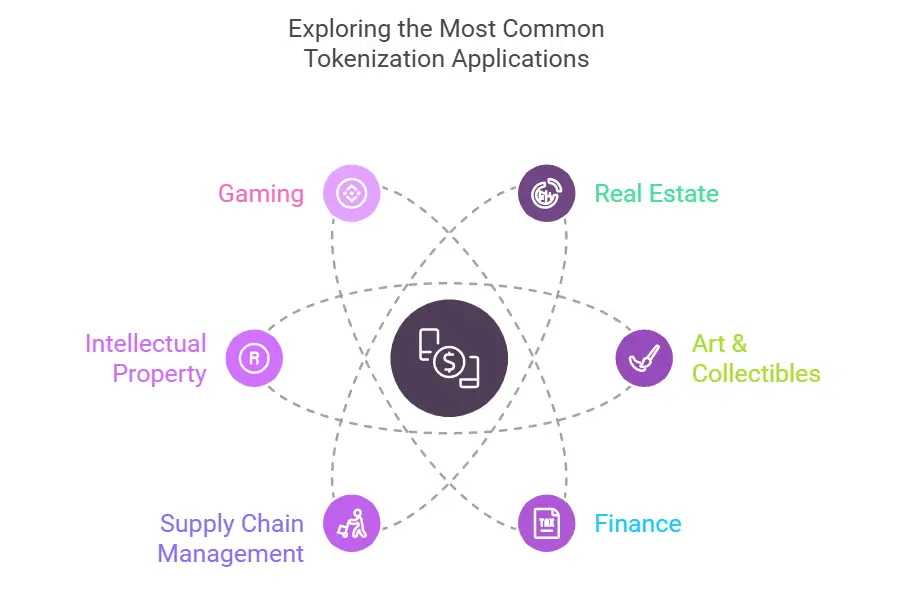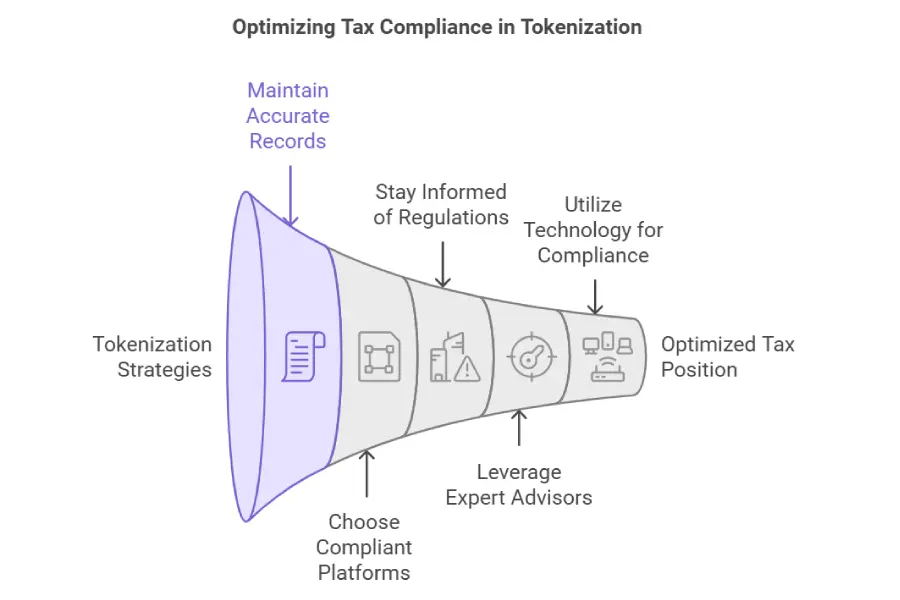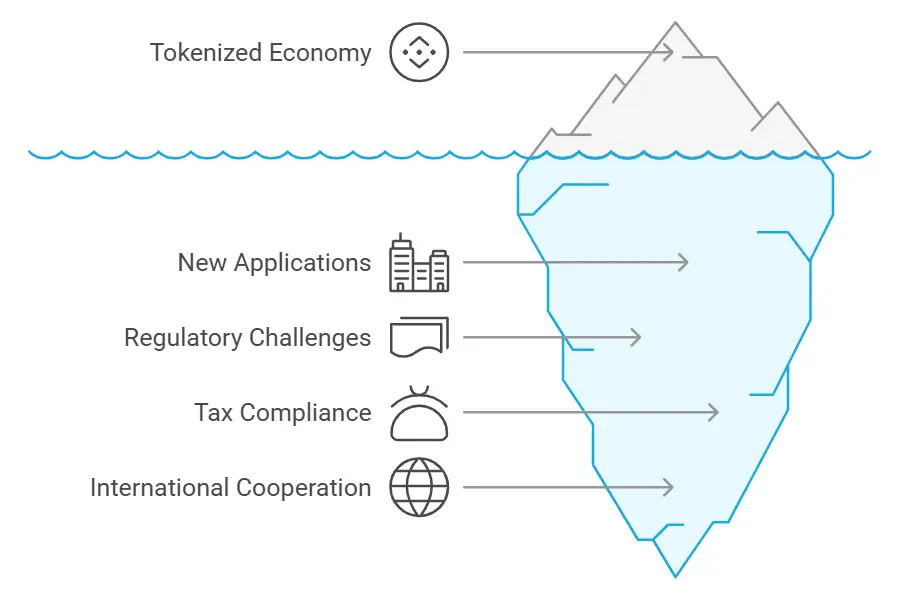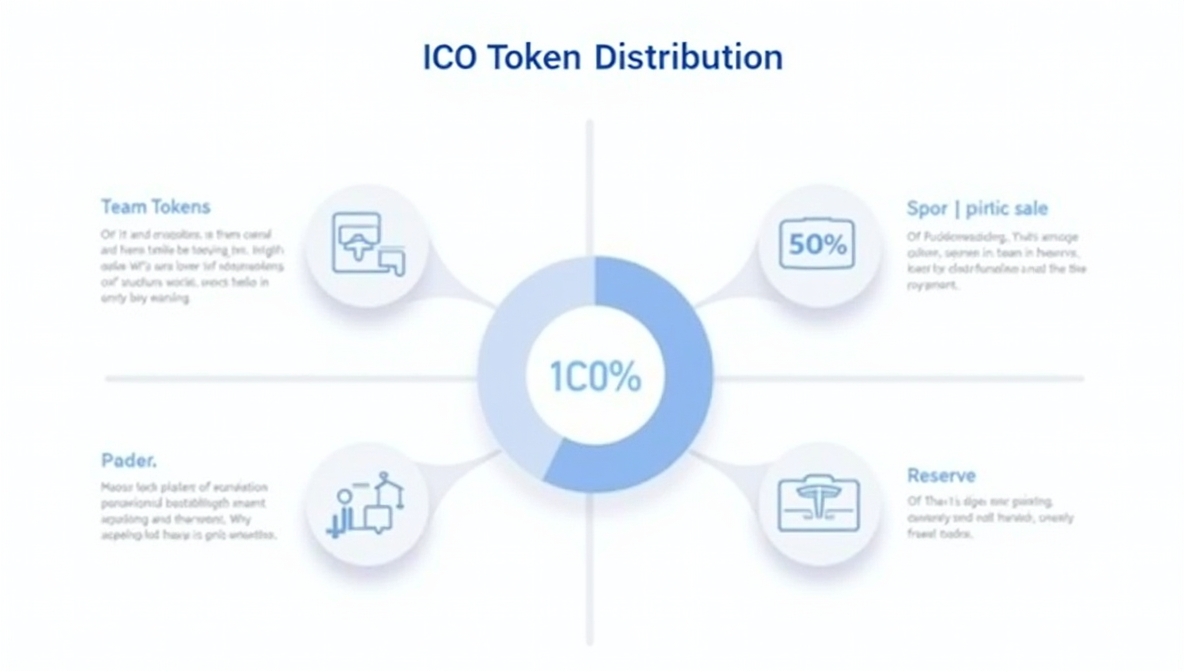Tokenization is transforming how we own, trade, and invest in assets in today’s digital economy. It allows individuals to purchase fractions of real estate, invest in startups, or own valuable artwork through blockchain-based tokens. While this innovation opens up previously inaccessible markets, it also raises complex challenges, especially concerning tax regulations.
The potential benefits of tokenization include increased liquidity, reduced transaction costs, and fractional ownership across sectors like real estate and finance. However, robust tax frameworks are needed to navigate the decentralized nature of blockchain transactions effectively.
In this guide, we will examine the relationship between tokenization and tax regulation, highlight the differences between legal tax avoidance and illegal tax evasion, and provide insights for compliance in a tokenized economy. Whether you’re an experienced investor or a newcomer, this article will help you understand the complexities of the tokenized financial landscape.
By the end of this guide, you will have a clear understanding of how tokenization influences tax obligations, the regulatory measures in place to address these changes, and the strategies you can employ to stay compliant while maximizing your investment potential. Join us as we unravel the complexities of tokenization and tax regulation, providing you with the tools to thrive in this dynamic and innovative financial ecosystem.
Understanding the Landscape of Tokenization
Tokenization is the process of converting physical or digital assets into blockchain-based tokens that represent ownership. These tokens are unique, immutable, and easily transferable, enabling fractional ownership and enhancing liquidity across various markets. Unlike traditional asset ownership, tokenization allows for the seamless division and trade of assets that were once illiquid and difficult to manage.
Modern & Common Applications of Tokenization

Real Estate: Tokenization allows multiple investors to own a portion of a high-value property, making real estate investment more accessible and liquid.
Art and Collectibles: High-end artworks can be tokenized and sold to multiple investors, democratizing access to the art market.
Finance: Traditional assets like bonds and stocks can be securitized into tokens, streamlining trading and investment processes.
Supply Chain Management and Intellectual Property: Tokenization extends beyond finance and real estate, facilitating more efficient management and trading of assets in various industries.
Intellectual property rights enable the tokenization of creative works, simplifying licensing, ownership transfer, and revenue sharing for creators.
Game: In-game assets can be tokenized as NFTs, which allows players to securely buy, sell, and trade items on blockchain platforms.
The Growth of Tokenization Across Sectors
Tokenization’s potential spans numerous industries, including supply chain management, intellectual property, and even personal data. By breaking down large assets into smaller, tradable units, tokenization makes investment accessible to a broader audience, fostering inclusivity and innovation.
Importance of Tokenization in Modern Markets
Tokenization bridges the gap between traditional financial systems and the decentralized future, offering unprecedented flexibility and efficiency. It reduces barriers to entry, lowers transaction costs, and increases market liquidity, making it a transformative force in the global economy.
The Intersection with Tax Regulation
As tokenization reshapes asset ownership and trading, it introduces new complexities into the tax landscape. Governments and regulatory bodies must adapt to these changes to ensure fair taxation, prevent evasion, and maintain market integrity. Understanding the interplay between tokenization and tax regulation is crucial for investors, businesses, and policymakers alike.
The Importance of Tax Regulation in Tokenized Economies
Tax systems have historically evolved around physical transactions and well-established asset classes. The emergence of tokenized assets challenges these traditional frameworks, necessitating a reevaluation of how taxes are applied and collected. Tokenized assets operate in a digital realm that often bypasses conventional regulatory oversight, creating potential gaps in tax enforcement.
Potential Revenue Losses
Without robust tokenization and tax compliance, the global economy risks leaking trillions in lost revenue. According to the OECD, tax evasion and aggressive tax avoidance already represent significant drains on public coffers. Adding cryptocurrency tax avoidance and complex tokenized asset structures to the mix creates a recipe for regulatory headaches. Governments must adapt swiftly, leveraging technology to identify taxable events on-chain and ensuring that asset tokenization doesn’t become a backdoor for illegal activities.
Building Trust and Encouraging Participation
For investors and businesses, stable and transparent rules around regulatory impact on tokenization build trust. Clarity encourages more participants to enter the market, fuels sustainable growth, and increases overall market liquidity. Without such frameworks, fear of legal repercussions and uncertainty over proper reporting will deter legitimate players, stalling the full potential of this transformational technology.
Global Standardization
The global nature of blockchain means that inconsistent regulations across jurisdictions can create confusion and loopholes. Token economy and taxation necessitate a move towards consistent international standards to ensure fair taxation and reduce opportunities for evasion. Harmonizing regulations helps create a level playing field, fostering global cooperation and compliance.
Breaking Down Tax Avoidance vs. Tax Evasion
Tax avoidance involves using legal strategies to minimize tax liabilities, often leveraging loopholes in tax laws. It’s a common practice in both traditional and digital financial contexts, aimed at optimizing tax efficiency without crossing legal boundaries.
Legal Strategies to Minimize Tax Liability:
✅ Offshore Accounts: Placing assets in jurisdictions with favorable tax treaties to reduce overall tax burdens.
✅ Tax Credits and Deductions: Utilizing available tax credits and deductions to lower taxable income.
✅ Timing of Transactions: Strategically timing the sale or transfer of assets to fall within beneficial tax periods.
Examples of Tax Avoidance in Tokenized Economies
In the traditional financial world, investors might place assets in offshore accounts or use tax credits to reduce their tax bills. In the tokenized economy, these strategies can be applied in more sophisticated ways:
Holding Assets in Tax-Friendly Jurisdictions: Investors can store tokenized assets in countries with lower capital gains taxes, effectively reducing their tax liabilities on profits. For example, multinational corporations often allocate profits to subsidiaries in low-tax jurisdictions to minimize tax burdens.
Structuring Token Sales: By issuing tokens through mechanisms that defer tax liabilities until a later date, investors can engage in better tax planning. This approach allows for strategic timing of income recognition to align with favorable tax periods.
Exploiting Regulatory Gaps: Taking advantage of discrepancies between different jurisdictions’ tax laws enables investors to minimize tax obligations legally. This practice involves leveraging varying tax treatments across countries to reduce overall tax liability.
Read More: Asset Tokenization Challenges: Top Ways to Overcome Them
Complexity in Tokenization
In the tokenized realm, tax avoidance often involves navigating overlapping regulations, analyzing the blockchain tax implications of different protocols, and staying updated on shifting policies. The code-based nature of blockchain systems makes it easy to automate certain tax-planning strategies, magnifying their potential impact. This complexity necessitates a deep understanding of both blockchain technology and tax law to ensure that avoidance strategies remain within legal boundaries.
Understanding Tax Evasion
Tax evasion is the act of illegally avoiding taxes by hiding income or misrepresenting financial information. Unlike tax avoidance, which involves using legal strategies to minimize tax liability, tax evasion crosses the line into criminal behavior. It’s a serious offense that can lead to significant financial penalties, legal trouble, and reputational damage.
One common way individuals evade taxes is by underreporting income, such as failing to disclose gains from tokenized assets or cryptocurrency trades. Others may hide assets using anonymous wallets or privacy-focused cryptocurrencies like Monero or Zcash, which make it difficult for authorities to trace ownership. In some cases, people even create false records or manipulate transaction histories to reduce their taxable income.
The consequences of tax evasion can be severe. Financial penalties, often including substantial fines and interest on unpaid taxes, are almost guaranteed when someone is caught.
⚖️ Tax Advisory Insight: Beyond the financial impact, individuals or businesses face reputational damage that can harm their professional relationships and public standing. In the most serious cases, tax evasion can result in criminal charges, including imprisonment.
How Tokenization Facilitates Tax Evasion
The pseudonymity of blockchain transactions has made it easier for individuals to obscure their financial activities. For example, traders might move assets between multiple wallets or use privacy-focused cryptocurrencies to hide profits. Decentralized exchanges (DEXs) and mixers like Tornado Cash further complicate efforts to track these activities, allowing users to shuffle funds across wallets without leaving a clear trail.
Read More: Best Blockchain for Tokenization: Your Ultimate Guide
While blockchain’s transparency is often seen as a tool for accountability, these technologies show how it can also be exploited to avoid tax obligations. Deliberately failing to report gains from tokenized assets constitutes tax evasion and can lead to significant penalties.
The Bitqyck Case
In August 2021, the founders of Bitqyck, a cryptocurrency company, were charged with tax evasion. They admitted to underreporting income derived from digital assets, ultimately facing hefty fines and legal consequences. This case serves as a cautionary tale about the legal repercussions of using cryptocurrencies to conceal taxable income. It also highlights the increasing scrutiny regulators place on the crypto space.
The Role of Regulations
Authorities worldwide are cracking down on cryptocurrency tax evasion. In the United States, the IRS imposes strict penalties, including fines of up to $100,000 for individuals or $500,000 for corporations, and up to five years of imprisonment in severe cases. The agency has also ramped up enforcement by requiring cryptocurrency exchanges to report user transactions, making it harder for individuals to evade taxes undetected.
As tokenization grows, so does the importance of transparency and compliance. While the blockchain industry offers immense opportunities for innovation and financial growth, it also demands responsibility from its participants. For those involved in tokenized assets, understanding and adhering to tax laws is not just a legal obligation it’s a way to avoid severe consequences and maintain trust in this rapidly evolving ecosystem.
Drawing the Line: Key Differences
From a policy perspective, the distinction between tax avoidance and tax evasion must be crystal clear. Regulators use audits, data analytics, and international cooperation to spot suspicious patterns. Even as blockchain technology evolves, law enforcement is catching up by deploying advanced analytics to trace transactions across multiple blockchains, narrowing the anonymity gap.
| Aspect | Tax Avoidance | Tax Evasion |
| Legality | Legal | Illegal |
| Intent | Minimizing tax liability | Concealing taxable income |
| Examples | Offshore investments, tax credits | Unreported cryptocurrency gains, false documentation |
Real-World Case Studies
Legal Boundaries and Ethical Considerations
Navigating tokenization and tax regulation requires understanding these differences. Tax avoidance, while legal, can sometimes push ethical boundaries, especially when exploiting loopholes that lawmakers did not intend to be used in such ways. Tax evasion, however, unequivocally breaches legal and ethical standards, leading to significant consequences for individuals and entities involved.
Tax Avoidance Case Study: The Winklevoss Twins and Gemini Exchange
Gemini cryptocurrency exchange continues to lead in compliance tools for digital assets. In 2023, the platform provided users with profit/loss statements and allowed them to input cost basis information for transferred assets, ensuring transparency and accurate tax reporting. This proactive approach showcases how tokenization platforms can align with evolving tax frameworks while maintaining user trust.(source)
Tax Evasion Case Study: FTX Collapse and Regulatory Scrutiny
The 2022 collapse of FTX highlighted severe gaps in financial transparency and regulatory oversight. Billions in customer funds were misappropriated, prompting calls for stricter global regulations on digital asset exchanges. This event underlined the necessity for robust tax compliance mechanisms, as regulatory bodies increasingly focus on safeguarding investors and ensuring market integrity.(source)
Understanding these distinctions is crucial for anyone involved in the tokenized economy, ensuring that strategies remain within legal frameworks and ethical boundaries.
How Tokenization Facilitates Tax Avoidance Strategies
Tokenization can enable complex ownership structures spanning multiple jurisdictions, making it easier to implement tax avoidance strategies. For instance, an investor might break a large asset into numerous tokenized units, each residing in a tax-friendly region. By carefully selecting where transactions occur and which entity holds which tokens, investors can significantly reduce their overall tax burden.
Structural Complexity and Decentralization
Decentralized Finance (DeFi) platforms operate without central intermediaries, providing participants with the ability to lend, borrow, or stake tokens independently. This decentralization offers novel ways to restructure capital, often outside traditional tax jurisdictions. Without a central authority overseeing compliance, it becomes easier for participants to exploit regulatory gaps, either legally or illegally.
Smart Contracts and Automated Compliance Minimization
Smart contracts, self-executing code on a blockchain, can automate trading strategies optimized for minimizing taxable events. These contracts can be programmed to trigger transactions based on specific conditions, ensuring that gains are locked in at favorable times or that losses are deferred strategically.
Balancing Automation and Compliance
While smart contracts can enhance tax efficiency, they also introduce risks if not properly designed. Automated strategies must adhere to legal boundaries to avoid crossing into tax evasion. Properly structured smart contracts can help maintain compliance by ensuring that all taxable events are accurately recorded and reported.
Regulatory Oversight and Smart Contracts
As regulators become more familiar with smart contracts, they are likely to develop guidelines and frameworks to ensure that these automated systems comply with tax laws. This includes requiring transparent reporting mechanisms and integrating compliance features directly into the contract code.
The Future of Automated Tax Strategies
The integration of smart contracts in tax strategies represents a significant shift in how taxes are managed and enforced. As technology evolves, so too will the sophistication of both tax planning and tax enforcement, necessitating continuous adaptation from all stakeholders involved.
Real-World Examples of Tokenization and Tax Avoidance
Kraken’s Proactive Approach to Tax Compliance
Kraken, one of the leading cryptocurrency exchanges, has consistently demonstrated its commitment to regulatory compliance. In 2023, Kraken introduced advanced tax reporting tools, allowing users to automatically generate detailed profit and loss statements. By integrating features like customizable cost basis tracking and real-time tax calculations, the platform ensures that investors can meet their tax obligations with ease. Kraken’s efforts exemplify how tokenization platforms can foster trust and compliance in a rapidly evolving regulatory landscape.
Singapore’s Tokenized Real Estate
Singapore continues to lead in the tokenized real estate sector. Platforms like ADDX facilitate fractional ownership of premium properties, allowing investors to earn rental yields directly recorded on blockchain systems. This integration streamlines tax reporting and showcases how tokenization fosters financial inclusivity while meeting regulatory standards.(source)
MicroStrategy’s Bitcoin Strategy and Tax Implications
In recent years, MicroStrategy has emerged as a prominent corporate advocate for Bitcoin investment, holding over 152,000 BTC as of late 2023. This strategic move positions Bitcoin as a key treasury reserve asset, sparking significant discussions around its tax treatment. By classifying Bitcoin as an intangible asset under U.S. GAAP, MicroStrategy provides a clear precedent for navigating tax and accounting requirements in the digital asset space. This example highlights the increasing need for robust tax frameworks to support corporate adoption of tokenized assets.
Implications
These real-world examples demonstrate how tokenization can be leveraged for effective tax avoidance within legal boundaries, while also highlighting the necessity for robust regulatory frameworks to ensure compliance and transparency.
Tokenization’s Impact on Tax Evasion Risks
Governments are ramping up efforts to enhance blockchain transparency, implementing stricter reporting requirements and advanced analytics to detect tax evasion risks.
Challenges in Tracking Tokenized Transactions
Even the best-prepared tax authorities find tracking tokenized transactions daunting. Blockchain technology, though transparent in theory, can become opaque in practice due to the use of privacy-enhancing technologies. Tools such as mixers, tumblers, and privacy-focused cryptocurrencies obfuscate transaction histories, making it difficult for authorities to trace the flow of assets.
Cross-Chain Bridges
Cross-chain bridges allow funds to move seamlessly from one blockchain to another, adding another layer of complexity to tracking efforts. These bridges can obscure the origin and destination of tokens, further complicating tax enforcement.
Impact on Tax Authorities
The pseudonymous nature of blockchain transactions poses significant challenges for tax authorities. Identifying the real-world identities behind wallet addresses requires advanced analytics and often cooperation with multiple jurisdictions. Despite these challenges, governments are investing heavily in blockchain analytics tools to bridge the anonymity gap.
Statistics on Tax Evasion Risks
Recent studies by Chainalysis in 2024 indicate that over $50 billion in DeFi transactions remain unreported annually, amplifying risks of tax evasion. This trend underscores the urgency for enhanced blockchain analytics and international cooperation to address regulatory blind spots.
Enhanced Anonymity and Illicit Schemes
The anonymity and pseudonymity features of blockchain can be exploited to create sophisticated tax evasion schemes. High-net-worth individuals or entities can continuously move tokenized assets through a web of pseudo-identities, making it extremely challenging for tax authorities to prove wrongdoing.
Consequences of Illicit Schemes
- Loss of Tax Revenue: Governments lose significant revenue needed for public services and infrastructure.
- Increased Enforcement Costs: Authorities must allocate more resources to track and investigate these sophisticated evasion techniques.
- Erosion of Trust: Public trust in both the tax system and tokenized markets can be severely undermined if evasion becomes widespread.
Mitigation Efforts
To combat these risks, tax authorities are deploying advanced blockchain analytics, leveraging machine learning and big data techniques to identify suspicious patterns and trace transactions. These efforts aim to narrow the window for evasion and ensure that those who exploit tokenization for illegal purposes are held accountable.
Proactive Measures
Investing in education and training for tax officials on blockchain technology, fostering international cooperation, and developing comprehensive regulatory frameworks are essential steps toward mitigating the risks of tax evasion in tokenized economies.
Economic and Political Consequences of Tokenization-Driven Tax Evasion
The rise of tokenization the process of converting assets into digital tokens on a blockchain has revolutionized financial markets by enhancing liquidity and democratizing access to investments. However, it has also introduced avenues for tax evasion, leading to significant economic and political repercussions.
Eroding Trust in Markets
When tokenized assets are used to facilitate tax evasion, it undermines the integrity of financial markets. Honest investors and businesses may perceive the system as unfair, believing that those who exploit regulatory loopholes gain an undue advantage. This perception can lead to decreased participation and reduced investment, ultimately diminishing market liquidity.
For example,a study published by the National Bureau of Economic Research revealed that in Norway, 88% of cryptocurrency investors failed to report their holdings, leading to significant tax evasion. This widespread non-compliance eroded trust in the financial system and highlighted the challenges regulators face in ensuring compliance within tokenized markets. (source)
Impact on Market Dynamics
The facilitation of tax evasion through tokenization affects market dynamics in several ways:
- Reduced Participation: Potential investors may be deterred by the perceived unfairness and fear of regulatory scrutiny, leading to decreased market engagement.
- Capital Flight: Legitimate capital may exit tokenized markets to avoid association with illicit activities, hindering growth and innovation.
- Illicit Market Dominance: If tax evasion becomes rampant, tokenized markets could become dominated by illicit actors, further undermining their legitimacy and appeal to mainstream investors.
Draining Public Funds
Tax evasion facilitated by tokenization results in substantial revenue losses for governments, impacting their ability to fund public services such as infrastructure, education, and healthcare. This shortfall can lead to budget deficits, necessitating either cuts in public services or increases in taxes elsewhere.
For instance, the U.S. Treasury Department has recognized the significant tax revenue losses due to unreported cryptocurrency transactions. In response, it implemented regulations requiring cryptocurrency platforms to report user transactions to the IRS, aiming to curb tax evasion and recover lost revenues. (source)
Long-Term Economic and Social Consequences
Persistent tax evasion through tokenization can lead to:
- Infrastructure Degradation: Reduced public funding hampers maintenance and development of essential infrastructure, affecting economic growth and quality of life.
- Social Inequities: Inadequate funding for public services exacerbates social inequalities, leading to broader societal issues.
- Economic Instability: Continuous revenue losses contribute to economic instability, impacting both national and global markets.
Risk of Regulatory Backlash
Unabated tax evasion linked to tokenization may provoke stringent regulatory responses, including:
- Stricter Tax Laws: Implementation of more rigorous tax laws and reporting requirements for tokenized assets.
- Increased Surveillance: Enhanced monitoring of blockchain transactions to detect and prevent evasion.
- Technological Restrictions: Limitations on blockchain technologies that facilitate anonymity and evasion.
The European Union has proposed the Markets in Crypto-Assets (MiCA) regulation, aiming to increase transparency and establish a comprehensive regulatory framework for digital assets, thereby addressing issues related to tax evasion and market integrity.
Challenges in Balancing Regulation and Innovation
While regulatory measures are necessary to curb tax evasion, overly restrictive policies can stifle innovation in the blockchain and tokenization sectors. Achieving a balance requires:
- Clear Guidelines: Establishing transparent regulations that provide clarity for market participants.
- Stakeholder Engagement: Involving industry stakeholders in the regulatory process to ensure practical and effective measures.
- Adaptive Frameworks: Developing flexible regulatory frameworks that can evolve with technological advancements.
Legal Complexities
Addressing tax evasion in the digital space presents unique legal challenges, including:
- Jurisdictional Issues: The global nature of blockchain transactions complicates jurisdictional authority and enforcement.
- Technological Complexity: The rapid pace of blockchain innovation requires legal frameworks to be adaptable and technologically informed.
- International Cooperation: Effective regulation necessitates collaboration among international regulatory bodies to address cross-border tax evasion.
In conclusion, while tokenization offers significant benefits, it also poses challenges related to tax evasion that can have profound economic and political consequences. Addressing these issues requires a balanced approach that fosters innovation while ensuring regulatory compliance and market integrity.
The Regulatory Impact on Tokenization: Current Frameworks and Future Trajectories
Policymakers are increasingly exploring tailored frameworks to address the unique challenges of tokenized assets, aiming to balance innovation with compliance.
Existing Laws and Their Limitations
Current tax laws were primarily designed for traditional asset transactions, not for the nuanced and decentralized nature of tokenized assets. Many jurisdictions apply existing tax laws to cryptocurrencies, treating them as property or commodities, which can create confusion when dealing with fractionalized and highly liquid tokenized assets.
Challenges with Current Frameworks
Asset Classification: Determining how tokenized assets are classified for tax purposes can be unclear, especially when tokens represent complex derivatives or hybrid assets.
Valuation Issues: Accurately valuing tokenized assets for tax purposes is challenging, particularly when tokens trade across multiple platforms and jurisdictions.
Reporting Requirements: Existing reporting systems may not adequately capture the volume and complexity of tokenized transactions, leading to gaps in tax collection.
IRS Expands Crypto Tax Guidance Amid Industry Growth
In 2019, the IRS issued additional guidance on virtual currency transactions, clarifying tax treatments for various activities, including hard forks and airdrops. This guidance supplements the initial 2014 notice, which classified virtual currencies as property for tax purposes. Despite these efforts, the rapid evolution of tokenized assets continues to outpace existing regulations, highlighting the need for more comprehensive and updated tax frameworks.(source)
Need for Tailored Regulations
The limitations of existing laws highlight the urgent need for tailored regulations that specifically address the unique characteristics of tokenized assets. These regulations should provide clear guidelines on classification, valuation, and reporting to ensure that tax obligations are met accurately and efficiently. Tailored regulations can help prevent loopholes that enable tax evasion and ensure that tax collection keeps pace with technological advancements.
International Efforts and Cooperation: Toward Harmonized Standards
The global nature of blockchain and tokenization has introduced unique challenges to taxation and regulation. As digital assets operate across borders, international organizations and governments are recognizing the need for harmonized standards and cooperative frameworks to manage these complexities effectively.
Driving Key Initiatives
Efforts to unify regulatory approaches are gaining momentum. The OECD’s Crypto-Asset Reporting Framework (CARF) stands out as a significant development, aimed at ensuring that cross-border activities involving crypto-assets are not overlooked. CARF seeks to create standardized reporting protocols, bringing much-needed clarity to global crypto taxation.
Similarly, the G20 and FATF are actively working on comprehensive guidelines to enhance transparency in the crypto space. Their focus includes reducing risks associated with tax evasion and money laundering, making it easier for jurisdictions to cooperate on enforcement.
Another critical component of these efforts is bilateral agreements between countries. These agreements facilitate data sharing and joint enforcement, enabling nations to better track tokenized assets and ensure compliance with tax laws.
Benefits of Collaboration
International cooperation delivers several clear advantages. By harmonizing standards, regulators can reduce regulatory arbitrage, preventing investors from exploiting inconsistencies between jurisdictions. This alignment makes compliance more straightforward, allowing tax authorities to more effectively track and tax tokenized assets across borders.
Moreover, standardized frameworks significantly improve transparency. With clear reporting requirements, tokenized economies can maintain integrity and attract legitimate participants, fostering growth while curbing illegal activities.
Overcoming Challenges
Despite its potential, achieving global cooperation is not without obstacles. Divergent legal systems and tax laws across countries often complicate efforts to establish uniform standards. Additionally, data privacy concerns present a delicate balance ensuring transparency without infringing on individual rights remains a major hurdle.
Another challenge lies in technological disparities. Different levels of blockchain expertise and technological infrastructure among jurisdictions can slow down efforts to implement cohesive systems.
Future Directions
Looking ahead, the trajectory of international cooperation points toward more unified and comprehensive regulatory frameworks. These frameworks will likely address the global nature of tokenization, ensuring smoother compliance for investors and platforms alike. Governments will be better equipped to collect taxes effectively, and the tokenized economy can thrive with enhanced transparency and fairness.
Through sustained collaboration, the potential for a well-regulated and prosperous global tokenized economy is within reach. As stakeholders continue to work together, these efforts promise to build trust, drive innovation, and ensure equitable participation across borders.
Technological Solutions for Compliance
As regulatory bodies grapple with the complexities of tokenization, technology offers promising solutions to enhance compliance and tax enforcement.
Blockchain Analytics Tools
Advanced blockchain analytics tools can scan public blockchains for suspicious patterns, trace transactions across multiple blockchains, and identify links between wallet addresses and real-world identities. These tools leverage machine learning and big data to improve accuracy and efficiency in detecting tax evasion.
Integration of KYC and AML Protocols
Know Your Customer (KYC) and Anti-Money Laundering (AML) protocols are being integrated into token platforms to enhance transparency and accountability. By verifying the identities of participants and monitoring transactions for suspicious activity, these protocols help prevent illicit activities and ensure compliance with tax regulations.
Compliance by Design
Tokenization platforms are increasingly incorporating compliance features directly into their systems. This includes automated tax reporting, real-time tracking of taxable events, and integration with tax filing systems. Compliance by design ensures that tax obligations are met seamlessly, reducing the risk of inadvertent evasion and simplifying the reporting process for investors.
Example of Technological Integration: Coinbase’s Tax Reporting Tools
Coinbase, a leading cryptocurrency exchange, provides comprehensive tax reporting tools to assist users in complying with tax regulations. These tools automatically generate tax documents based on users’ transaction histories, categorizing transactions, calculating gains and losses, and producing detailed reports to simplify the tax filing process. (source)
In addition to these features, Coinbase has partnered with tax preparation software like TurboTax, enabling users to seamlessly import their transaction data for accurate tax reporting. (source)
These integrations exemplify how technological solutions can facilitate tax compliance within the cryptocurrency space.
Future Innovations
The future of compliance in tokenized economies will likely involve even more sophisticated technological solutions, such as decentralized identity systems, enhanced privacy-preserving technologies that still allow for regulatory oversight, and AI-driven tax auditing tools that can predict and identify evasion patterns before they become widespread.
Strategic Insights: Navigating Tokenization and Tax Regulation

Navigating the intersection of tokenization and tax regulation requires careful planning, adaptability, and a commitment to compliance. By focusing on proactive strategies and leveraging technology, you can optimize your tax position while staying within legal boundaries.
Maintain Accurate Records
Keeping detailed records of all token transactions is critical for tax compliance. Documenting timestamps, purchase and sale prices, jurisdictions, and the nature of assets not only ensures accuracy but also makes the process smoother during audits. To make record-keeping efficient, consider using blockchain analytics tools or platforms that automate transaction logging.
Choose Compliant Platforms
The tokenization platform you select plays a pivotal role in your compliance efforts. Look for platforms with transparent reporting features and automated tax calculations. These features simplify tax filing and reduce the risk of errors, enabling you to focus on your investment strategies without unnecessary complications.
Stay Informed of Regulations
With tax laws for digital assets constantly evolving, staying updated is essential. Regularly consult authoritative sources like the IRS or OECD for official guidance. Additionally, keep an eye on trusted financial news outlets and blockchain industry publications to remain informed about industry trends and regulatory updates.
Conduct Transparent Transactions
Clear and well-documented transactions reduce the risk of regulatory scrutiny. Opt for platforms that maintain detailed records and include compliance features. Privacy-preserving technologies can also be beneficial, as long as they align with regulatory oversight requirements.
Leverage Expert Advisors
Specialized advisors can be invaluable in navigating the complexities of tax regulation in tokenized economies. They provide expertise in cross-border regulations, help develop efficient tax strategies, and identify potential compliance risks. With their guidance, you can maximize your efficiency while ensuring your actions align with all legal requirements.
Diversify Across Jurisdictions Responsibly
Strategic diversification of tokenized assets across jurisdictions can help you leverage tax treaty benefits. However, it’s vital to understand the specific reporting requirements of each region and ensure compliance with local laws. Balanced distribution of assets can optimize tax outcomes while maintaining regulatory adherence.
Utilize Technology for Compliance
Technology offers powerful tools for managing tax compliance in the tokenized world. Blockchain analytics tools can trace transactions and link wallet addresses to real-world identities, while integrated reporting systems streamline the tax filing process. Leveraging these technologies reduces administrative burdens and enhances accuracy.
Prepare for Audits
Being audit-ready is crucial to avoid penalties and ensure seamless interactions with tax authorities. Maintain organized, accessible records of all token transactions and demonstrate transparency in your activities. This proactive approach builds credibility and minimizes potential issues during audits.
Stay Agile and Adaptable
Tokenization and tax regulation are rapidly evolving fields. Staying informed about emerging trends and regulatory changes allows you to adapt your strategies accordingly. By investing in continuous education and monitoring developments, you can remain ahead of potential challenges and capitalize on new opportunities.
Implementing these strategies ensures that you remain compliant and well-prepared while optimizing your tax position. In the dynamic world of tokenized economies, a thoughtful and proactive approach is your greatest asset.
Adapting to the Future: Balancing Innovation and Compliance

As blockchain technology and tokenization continue to advance, they bring both exciting opportunities and unique challenges for tax regulation. These developments demand forward-thinking strategies to ensure innovation thrives without compromising compliance.
The Evolution of Blockchain Technology
Token standards such as ERC-20, ERC-721, and ERC-1155 have revolutionized the way assets are represented on the blockchain, from fungible tokens to unique digital collectibles. As these standards expand, they create complexities in tax treatment, especially when tokens operate across multiple blockchains, complicating tracking and reporting.
Identity solutions are also evolving. Decentralized Identity (DID) systems and self-sovereign identities empower users to control their data while enhancing transparency. These tools are critical for aligning blockchain technology with tax compliance, enabling more accurate reporting without sacrificing privacy.
Emerging Applications and Opportunities
The rise of Decentralized Autonomous Organizations (DAOs) introduces new organizational structures that challenge traditional tax frameworks. Similarly, tokenized securities blend blockchain with conventional financial instruments, creating a hybrid that necessitates innovative regulatory approaches. These advancements not only diversify financial options but also improve market liquidity, democratize investment opportunities, and drive the creation of novel financial products.
Balancing Growth with Regulation
To maintain this momentum, regulators must stay agile, crafting policies that accommodate technological advancements while preserving tax integrity. This balance is essential for fostering an environment where innovation and compliance coexist. Platforms play a crucial role in this effort by embedding compliance mechanisms from the start through transparent reporting systems, automated tax tools, and user education resources. These measures build trust and simplify the tax process for users.
Promoting Ethical Practices
Encouraging ethical behavior is another key to success. Platforms can reward compliance through incentives and implement strict penalties for non-compliance, creating a fair and transparent ecosystem. Publicly audited smart contracts and clear communication about compliance measures further strengthen user trust.
The Future of Tax Policy and Enforcement
As tokenization becomes more widespread, tax systems will need to adapt. New forms of taxation, such as transaction taxes or VAT on tokenized assets, could capture revenue more effectively. Unified tax filing platforms and automated reporting systems will streamline compliance for investors. Advanced technologies like AI-driven audits and real-time monitoring systems can proactively identify tax evasion risks, while international cooperation will be crucial for enforcing tax laws across borders.
A Flexible Yet Stable Approach
The dynamic nature of tokenized economies calls for tax systems that are both adaptive and stable. While flexibility ensures policies remain relevant, stability provides predictability for businesses and investors. Achieving this balance is critical for maintaining trust and enabling long-term growth.
Looking Ahead
The path forward for tax regulation in tokenized economies will rely on a mix of technological innovation, global collaboration, and adaptive policies. By prioritizing efficiency, transparency, and equity, regulators can support economic growth while safeguarding compliance. The future holds immense potential for a fair and thriving tokenized financial ecosystem, but it will require vigilance, adaptability, and a shared commitment to responsible innovation.
Conclusion
In an era shaped by digital innovation, tokenization and tax regulation are crucial for creating and exchanging value. It’s important to understand the difference between legal tax avoidance and illegal tax evasion to navigate the token economy responsibly. By recognizing the opportunities and risks, you can embrace innovation while adhering to the law.
The evolving regulatory landscape demands vigilance and adaptability in developing ethical tax strategies for digital assets. Governments are working to clarify these regulations, pointing toward a more standardized and fair market. Prioritizing compliance not only aligns with legal and moral principles but also enhances the sustainability of tokenized ecosystems.
Continue your journey in this field by staying informed, seeking guidance, and building relationships with trusted partners. This approach will help you thrive in the new financial era, leveraging tokenization as a tool for growth and responsible governance.
Key Takeaways
- Tokenization turns assets into blockchain-based tokens, offering fractional ownership and global access.
- Understanding the difference between legal tax avoidance and criminal tax evasion is essential for operating responsibly.
- Regulatory frameworks are evolving, aiming to support innovation while ensuring fair and enforceable tax rules.
- Maintaining compliance, through record-keeping, professional guidance, and transparent platforms avoids severe penalties and reputational damage.
The future likely holds more integrated solutions, where tokenization and tax regulation coexist harmoniously, fostering trust, growth, and stability.












